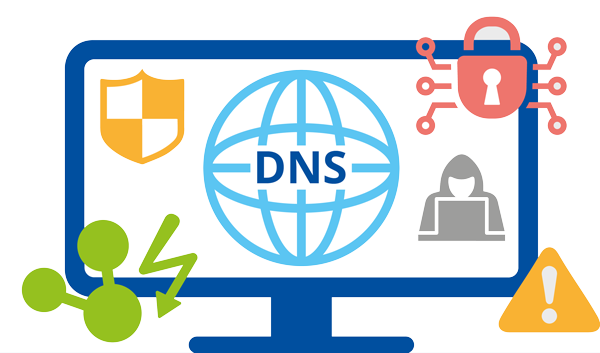Cloud-based DNS Security Services
Obtain unparalleled visibility, protection, and control over your DNS data, records, and IP addresses. Integrate sophisticated intelligence on threats.

Unlocking Defense-in-Depth: A Protection That Exceeds Conventional Methods
DNS is mission-critical for dynamic app access; if the DNS server goes down, a company cannot access any key applications or services. DNS data and servers have become prime targets for data espionage and access points. Businesses are making corporate network security a top concern, since many have suffered catastrophic losses due to DNS attacks, including massive commercial losses, application disruptions, and data theft. Traditional network security solutions have failed while concentrating on DNS protection. They are inefficient against several DNS attacks and unable to recognise DNS tunnelling or data exfiltration efforts.
DNS assaults are changing from brute-force attempts to more sophisticated internal network attacks. It necessitates the use of intelligent mitigation solutions by businesses in order to efficiently deal with shifting dangers. To manage DNS security, companies must check DNS traffic leaving their network and maintain access limitations and adequate hygiene for DNS-related accounts in order to stay attentive, repair security gaps, and patrol for possible breaches 24 hours a day.
Complete DNS Asset Management with CDWT: Cloud-based DNS Security
DNS assaults have devastating effects and cause considerable disruptions. DNS security solutions provide proactive monitoring capabilities to identify unauthorised or malicious bots that affect server performance, service availability, and network connection.
At CDWT, DNS security solutions provide improved precision, detection of malicious activities and compromised systems, enhanced security visibility and network protection, and a remarkable level of resiliency. We provide business continuity, 100% uptime, decrease total cost of ownership (TCO), and give a rapid return on investment while preventing the spread of attacks by feeding threat information into the corporate network ecosystem.
DNS Security Solutions: Principal Advantages
- Defend against every DNS assault
- Unique attack detection capabilities
- Adaptive security for improved service availability
- Simple to deploy and inexpensive
- Simple network security ecosystem integration










Threats to DNS Security, Classified
With the ever-changing structure of the digital ecosystem, DNS security threats are becoming more complex and difficult to detect. DNS servers are vulnerable to the following security risks:
Typo squatting
Typo squatting is the practise of registering a domain name that is almost identical to an existing domain or a well-known brand. This is considered a security issue since it presents a significant risk to corporate confidentiality. Cybercriminals may employ typosquatting to steal sensitive data. It is feasible to register a domain that closely resembles a well-known brand or domain for malicious purposes since it is simple to gather information about newly registered domains.
DDoS Attacks, or Distributed Denial of Service (DDoS)
Although not always malevolent, distributed denial of service (DDoS) assaults impede website server access. DDoS is a logical traffic bottleneck for websites, and it happens regularly when firms fail to prepare for network capacity. The number of incoming requests must be carefully examined for the servers to operate well. Employing a DNS provider is essential for defending against such attacks.
Amplification of DNS
Frequently, DNS servers are configured insecurely or with recursive setup. The DNS recursion strategy increases the reliability of the domain resolution process (turning text information into machine language). While the purpose of DNS amplification is to safeguard DNS, open recursive DNS servers are more susceptible to assaults and may be used to amplify DDoS attacks.
DNS Cache Pollution
Whenever a user visits the internet, a certain amount of data is cached on the server. Caching's primary goal is to increase internet speed by reducing the load on the DNS. Cache poisoning happens when a malicious webpage or domain is cached on the server.
DNS Tunnelling
As a trustworthy protocol, organisations allows DNS traffic to freely enter and depart their networks. Cybercriminals use DNS to exfiltrate data by using malware whose DNS queries include the data to be exfiltrated. As the target DNS server is under the control of the website's owner, the attackers ensure that data is sent to a server where they may analyse it and send a response to the DNS response packet.
Domain Hijacking
Domain hijacking is reconfiguring DNS servers and domain registrars to reroute traffic away from the original servers and to new ones. When attackers hijack a domain name, they utilise it to undertake fraudulent actions, such as establishing a fake website for payment processors such as PayPal, Visa, or banking systems. The attackers will develop an identical clone of the real website in order to steal sensitive information, such as email addresses, usernames, and passwords.
Best Security Practices for DNS
DNSSEC or DNS Security Extensions
Implementing DNSSEC to verify DNS information is recommended. To validate the procedure, DNCCEC uses public-key cryptography. Using certificate-based authentication, the root domain is verified. An efficient DNSSEC system verifies the legitimacy of the DNS server replying to a request.
Data Encryption
The data sent in DNS queries and answers may be encrypted to offer an extra degree of security to the server. Encrypting data increases security by preventing hackers from taking it for nefarious purposes. Even if the information is intercepted, it cannot be duplicated or used maliciously if it is encrypted.
Implementing Safe DNS Configurations
DNS servers may be separately administered inside an organisation. It stops DNS servers from interacting with one another and isolates them. As a result, if a single server is hacked, the impact will be restricted and will not affect the whole ecosystem. In order to avoid the compromise of a bigger collection of data, secure DNS settings may also limit the quantity of data each server maintains.
Continuously Conducting System Updates
DNS servers adhere to a schedule for regular modifications. It is essential to execute these updates periodically. Incorporating novel security protocols, these updates enable servers to discover and repair flaws before they impact the whole ecosystem.
Security Instruction
Training in IT security is needed to guarantee effective DNS server security maintenance. When consumers are aware of possible threats, they are able to browse the internet safely. For example, confirming website security certifications, avoiding clicking on unknown links, and executing security checks as necessary.
Improving Detection Protocols
A robust detection mechanism is essential for monitoring and preventing malware assaults in advance, such as an increase in DNS activity from a single source pertaining to a certain domain. When attackers try to access the DNS server for spoofing, malicious activity from a single source with several domain names increases.
Comprehensive DNS Security and Threat Management Services in the Cloud from CDW
- Cyber Threat Surveillance
- Intelligent Threat detection based on DNS
- Information Technology and Cyber Infrastructure Security
- Services for Web Application Security Testing
Provides continuous, in-depth threat monitoring across the entire IT stack, including people, devices, apps, networks, servers, and endpoint environments, etc.
Gain automatic alert management and optimization (to decrease alert fatigue), as well as insight into the risk posture of the whole company.
Integrate threat information to anticipate and detect attacks lying behind the most fundamental perimeter levels.
Analyze programmes that seem harmless to discover whether they might create larger assaults in the near future.
Safeguard IT infra end-to-end: systems, devices, computing infra, networks, servers, and more and obtain global threat monitoring and deep intelligent threat detection capabilities.
Analyze risks and initiate mitigations automatically and anticipate security gaps and threat patterns via advanced analytics.
Avial next-gen firewalls, web application firewalls, DNS Security, and Breach Preventions
Benefit from a Web Application Security Testing solution that use DAST and SAST (black box and white box methodologies) to discover emerging security vulnerabilities.
- Services for Malware Detection Scanning
- Network Security Services
- Database Activity Monitoring (DAM)
- MSS for Web Security / Protection
External and internal websites and subdomains of the web should be analysed for susceptible and/or incorrect code.
User-requested monitoring of dangerous behaviour, on-demand scanning for rapid inspection after malware eradication, and a comprehensive report on malicious material and web sites.
Utilize industry-leading network security to protect workloads and thwart intrusion attempts into servers.
Comparing the network process to industry best practises in areas such as incident management, backup, network monitoring, and security audits.
Obtain active monitoring of databases for probable occurrences of data abuse and further filtration.
Use management tasks include DAM Agent provisioning, deployment, tuning, and policy-based modifications.
Utilize monitoring operations such as event collection, storage, reporting, and customer notification.
Leverage web antivirus and web antispyware services to detect viruses and spyware against requests for web pages and attachments issued by users.
Web URL Filtering services to access certain Web pages or attachments.
Why Choose CDWT to Manage Your DNS Security?
Includes web-based application screening and enables whitelists and blacklists for each user.
Utilize technologies that are completely compliant, automated, and AIOps for the finest DNS security services.
Gain maximal cloud security advantages at lowest expense and incorporate innovative frameworks for threat management.
Get 24x7 automatic monitoring, DNS security, and counselling and support for cybersecurity.
URL filtering based on predefined categories and content restriction with time-based rules as an option.
With 360-degree DNS server protection, you can accomplish uncompromised security, continuous continuity, and unstoppable revolutionary development.
Gain effortless end-to-end protection for your infrastructure assets, including data, networks, workloads, traffic, and devices.
Utilize the in-built security controls for application networks, monitoring and logging, identity management, data protection, and configuration management.
DNS security best practises provide superior protection for websites and vital corporate applications.
An Influence with a Difference: A Glance into CDWT’s Global Expertise
The biggest application-centric managed service provider in the world, providing specialised Managed Security Services and AI-driven advanced Managed Detection and Response Services.
12+ years of experience, 4000 transformation tales in 26 countries, and 26 Centers of Excellence.
80000 EPS, 13000 HBSS, 3200 UTMs, 7 Reg-tech Frameworks, and more than 40 Security Controls.
Plus over two thousand cloud specialists with industry-leading certifications, including Hyperscaler Security, Hyperscaler Platform, CISSP, OSCP, CEH, CHFI, and Comp TIA Security.
Integration of intelligent automation-powered, proprietary cybersecurity products, such as the CDWT Self-Healing Operations Platform.
Expertise in compliance management assuring severe, flawless governance and adherence to local, national, and international legislation.
Advanced threat detection, proactive threat hunting, and best-in-class tools and procedures.
Comprehensive Threat Investigation and Verification using sophisticated Threat Intelligence driven by industry-leading platforms such as Microsoft, OSINT, STIX&TAXI, etc. and CDWT Threat specialists.
Cloud-native security with multi-cloud compatibility for the most popular cloud platforms, including AWS, Azure, GCP, Oracle, and IBM Cloud.
Experience in deploying and managing robust SIEM on AWS Cloud – helping enterprises to proactively assess vulnerabilities and automate and accelerate incident response on the AWS Cloud.
DNS Security Services – FAQs
When DNSSEC is enabled, resolvers examine authoritative DNS servers' DNS records for a valid digital signature. This signature is unforgeable, protecting visitors from being diverted to malicious websites.
The DNS firewall can maintain the operator's website or service if the server goes offline due to an attack or for any other reason by providing DNS responses from cache. A DNS firewall can offer speed improvements like quicker DNS lookups and lower bandwidth costs for the DNS operator to its security capabilities.






